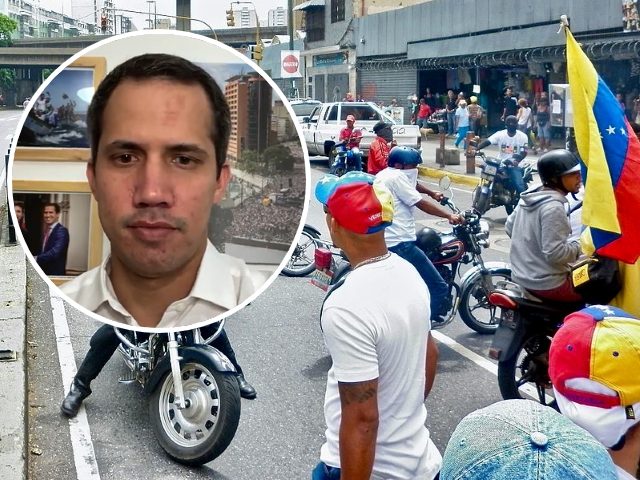A mob of pro-regime socialists assaulted Venezuelan President Juan Guaidó this weekend at a public event, shoving him out of a restaurant and throwing chairs at the heads of his staffers.
The event happened in northern Cojedes state just days after Guaidó endured the indignity of not being invited to the Summit of the Americas in Los Angeles, a decision President Joe Biden took after declaring weeks ago that, as it is not the legitimate government of the country, the socialist regime of dictator Nicolás Maduro would also not be invited to the event. The White House did not offer any clear explanation for why Guaidó did not receive an invite.
Juan Guaidó, a former lawmaker under the socialist Popular Will party banner, became the legal president of Venezuela in 2019 after Maduro’s sham presidential elections a year before. The Venezuelan constitution allows for the National Assembly, the top legislative body, to swear in an interim president tasked with convening a free and fair election as rapidly as possible in the event of a “rupture in the democratic order.” Lawmakers defined the 2018 presidential election as such and formally inaugurated Guaidó in January 2019.
Despite being the legitimate president of the country, Guaidó has exercised none of his technical presidential powers. As Maduro controls the military and nearly every government institution, Guaidó has only been able to appoint ambassadors to friendly countries. Within Venezuela, he wields no practical power and has largely lost the support of the Venezuelan people. The Venezuelan polling firm Meganálisis found in a poll in April that Venezuelans give Guaidó an 84.1 percent disapproval rating.
The incident in Cojedes happened at a restaurant on Saturday. Guaidó was in town to encourage Venezuelans to return to street protests against the regime – which largely subsided after the socialist opposition returned to “negotiations” with Maduro and to attract global attention to Venezuela’s dire humanitarian state under the Maduro regime. Reports indicate that those meeting with him at the restaurant were members of the socialist “opposition” Popular Will party, which Guaidó exited after becoming president.
Videos show a mob of people shouting “get out!” at Guaidó before someone shoves him towards the door, prompting the mob to physically assault him. Some begin throwing chairs, at least one of which appears to hit the head of someone on Guaidó’s team.
Some reports from independent Venezuelan outlets identified members of the mob as active politicians in the United Socialist Party of Venezuela (PSUV), Maduro’s de facto ruling party.
Following the news of the attack, Guaidó published an Instagram live video on Saturday to discuss the incident, which his press office reproduced on Sunday. The president accused the PSUV of orchestrating the attack.
“It was an ambush directed by lawmakers, or members, of parliamentary bodies that the regime currently usurps,” Guaidó said.
Saturday’s attack was the latest in a series of similar assaults that Guaidó has endured since becoming president in 2019. Maduro’s regime, like that of his predecessor Hugo Chávez, has used violent socialist gangs known as collectives to assault, intimidate, and kill opponents of the regime. More formally, the regime uses the National Bolivarian Guard (GNB), a wing of the armed forces, to subdue protests.
In 2020, Maduro deployed the GNB to keep Guaidó from entering his office in the National Assembly headquarters after illegally forcing him out of the position of president of the Assembly, which he maintained simultaneously with the title of interim president. Guaidó engaged in an altercation with GNB troops outside of the Assembly building, hopping the tall fence of the headquarters in an attempt to access his office with the help of supporters.
U.S. Secretary of State Antony Blinken responded to the video of the attack this weekend by stating that the Biden administration was “deeply concerned.”
America, he said in a post on Twitter, “condemns these escalating acts of violence, harassment, and intimidation against Interim President Juan Guaidó and all those who stand for democracy.”
The Biden administration – hosting the Summit of the Americas, a conference that convenes the heads of state of the members of the Organization of American States (OAS) – used its hosting privileges to not invite the Maduro regime to attend. While the OAS bans non-democracies from attending its events — which would technically bar Venezuela and Cuba from attending — far-left agitators had spent months pressuring Biden to break the rules and invite the socialist dictatorships anyway.
Biden also chose not to invite Guaidó, however, depriving Venezuela of any formal representation at the event. The State Department claimed prior to the Summit that inviting Guaidó would be a “White House call,” but the White House never explained the move.
Biden personally called Guaidó last week shortly after the news broke that he would not be invited to the event.
“President Joseph R. Biden, Jr. spoke today with Venezuelan Interim President Juan Guaidó to underscore the United States’ recognition of and support for the 2015 democratically-elected National Assembly and Guaidó as the Interim President of Venezuela,” according to a White House phone call readout.
“President Biden reaffirmed the United States is willing to calibrate sanctions policy as informed by the outcomes of negotiations that empower the Venezuelan people to determine the future of their country.”
Guaidó has softly expressed concern about negotiations with Maduro or America lifting sanctions, reflecting what polls show is the strong opposition of the Venezuelan people to both, but his voice has been regularly drowned out by more senior members of the socialist opposition, including leaders like former failed presidential candidate Henrique Capriles Radonski and current Socialist International Vice President Henry Ramos Allup. These calls for cooperation with Maduro have eroded support in the opposition, including Maduro, even further.

COMMENTS
Please let us know if you're having issues with commenting.